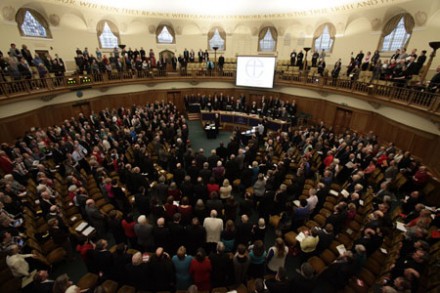The Anglicans who voted against women bishops showed true Dunkirk spirit
Now the ‘Church in turmoil’ headline will run for another five years.

A meeting of the General Synod at the Assembly Hall of Church House (Photo: PA)
According to the BBC News at Ten, which led with the story last night, the defeat of the women bishops measure in the General Synod represented the victory of “a vocal minority”. I interpret this to mean that having been given a vote, these dissenters from the majority line then proceeded to use their vote as they pleased, which is not the point of voting at all, at least not as the BBC sees it. It has all gone horribly wrong. The measure was meant to be passed. Now we will all have to wait five years, according to the Synod rules, until another vote can be taken, and we have a chance to finally get it right. What the BBC neglects to mention is that if you have a free vote, well, people must be allowed to vote freely. And if you set up rules allowing for a minority to block the will of the majority, can you complain when they do? They were your rules after all.
Rather oddly, I sympathise with the liberal consensus on this one. The Church of England ordains women, and has done so for over two decades; it must therefore follow that there is no theological reason for not consecrating them as bishops. To say that woman can become priests but not bishops is illogical.
At the same time one cannot but feel a sneaking admiration for the little over a third of the members of the House of Laity, who decided to resist the inevitable. They must know, however, that their voting down the measure will delay it but not in the end stop it. The Church of England must surely have women bishops; it is only a question of when; and a question of with what safeguards for dissenters. But the “vocal minority” have stood up against the overwhelming consensus inside the Church of England, and outside it too. (It is remarkable how people who never go to church care so deeply about women bishops!) They have shown the true Dunkirk spirit – though that they succeeded may have taken some of them by surprise.
In the end, does this matter? It does, in that it means that this question is still not resolved, and it would have been nice for the new archbishop to have come into office with all this behind him. The Church of England now faces five more years of an argument which is substantially over, bar the shouting. But that shouting will go on, and it may not be pretty. Moreover, there are better things to talk about; but the media will of course stick with the “Church in turmoil” headline that it loves so much.
But if those who oppose women bishops on theological grounds think that this represents a turning point, I very much doubt that this is the case. Female ordination is now part of the Anglican landscape. This last year more women were ordained than men in the Church of England, and in the not too distant future the Anglican ministry may become predominantly female. And the funny thing is that no one really minds. Those of us who oppose female ordination – and yes, I am certainly one that holds it to be an impossibility (if I did not, I would be an Anglican) – are the sort of people who the BBC and others look upon as a vocal minority: professional pains in the neck, who really ought not to be allowed to ruin the harmony of the overwhelming consensus mentioned above.
I seem to remember, years ago, back in the late 1980s, Margaret Thatcher saying something along the lines of “Women make wonderful dentists and doctors, why shouldn’t they make wonderful priests as well?” As in other matters, Mrs Thatcher spoke for so many when she uttered those words. For most of the United Kingdom, that is what the priesthood is – it is one of the caring professions, a form of social work, something that women can plainly do very well. So why shouldn’t they?
But my view of the priesthood is rather different from Mrs Thatcher’s. The priesthood is not a caring profession as such; it is a rather different line of work. In fact it is not work or a job at all. The priest exists for one thing and one thing only; all his other activities are icing on the cake; the priest is there to climb Mount Calvary and offer the Holy Sacrifice of the Mass. He is there to say hoc est enim corpus meum (“This is my body”). That is his one purpose, though he may fulfil many others as well. But amid the multitude of tasks, the centrality of the Eucharistic Sacrifice must not be lost sight of. But try to explain this to people who mutter about equality legislation being brought to bear, and it will seem to them to be antiquated nonsense.
Women priests seem perfectly natural to many Anglicans (and many liberal Roman Catholics too) because to them a priest is not really what, let us say, the Council of Trent had in mind. But I hold to the classical view of the priesthood, as exemplified by Trent and the Catholic tradition. As to the brave minority in the Synod, perhaps they may agree with me, in which case, their place is here, where I stand, on this riverbank, Tiber, not Thames.
No comments:
Post a Comment